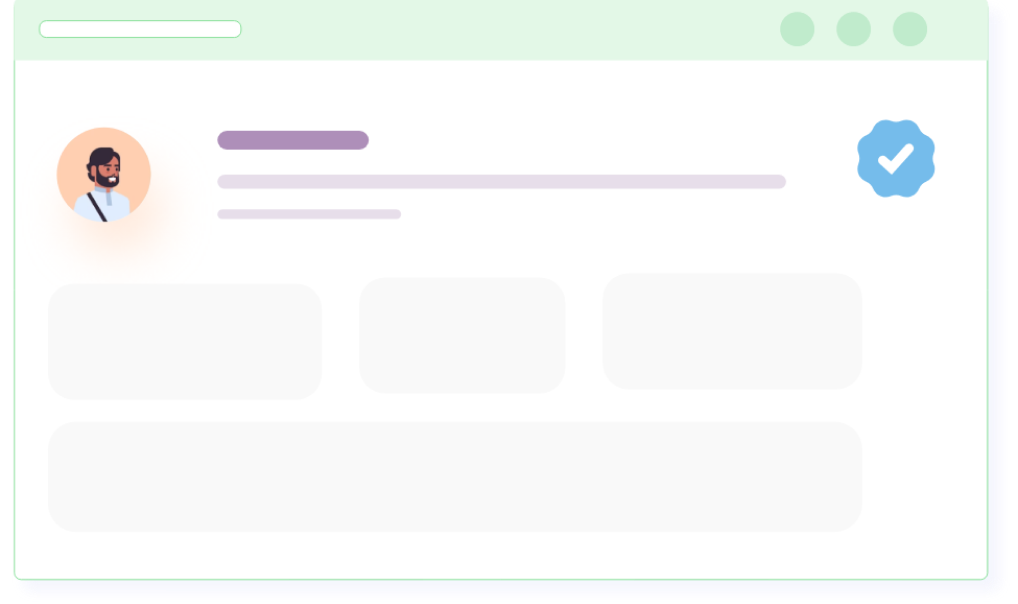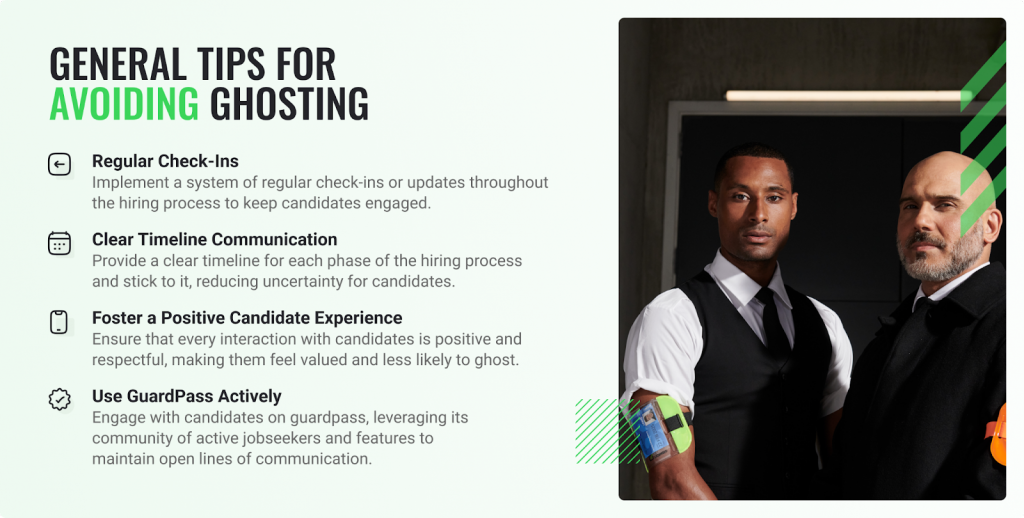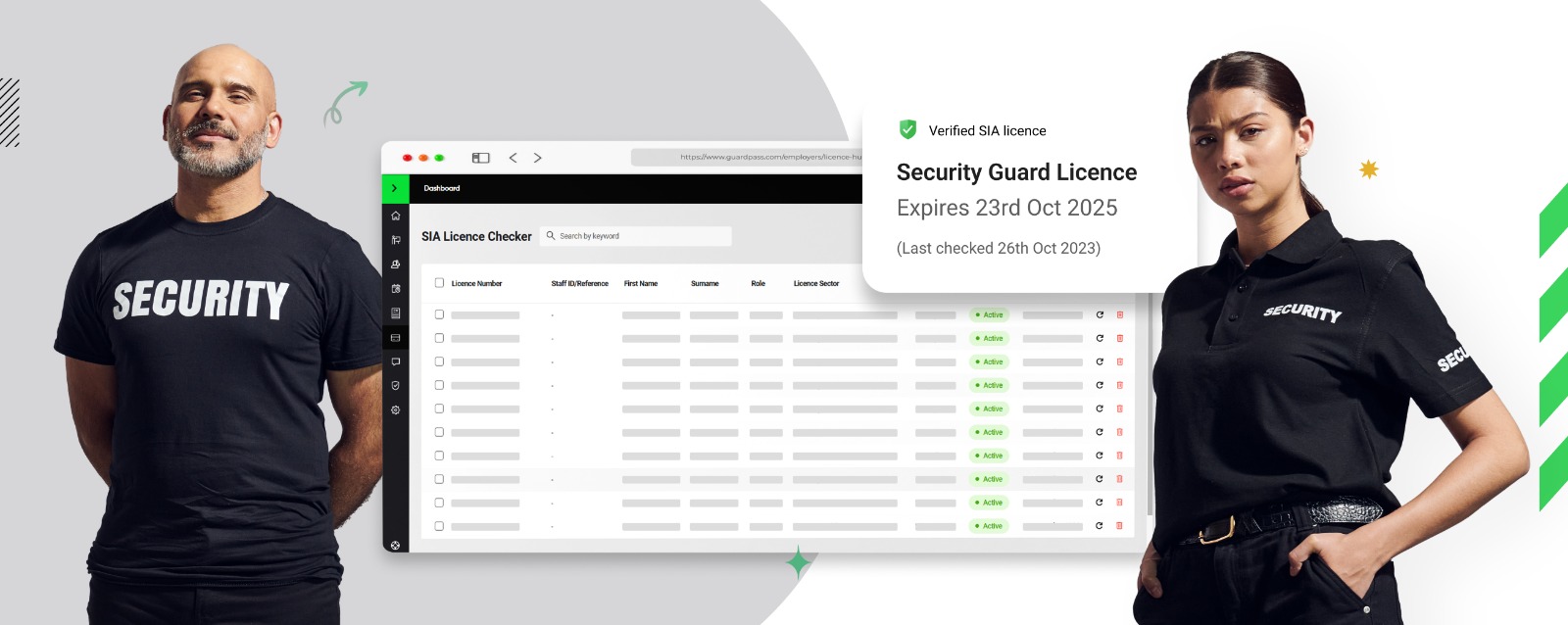In the UK’s bustling job market, ghosting has become a familiar spectre. Interestingly, around 76% of jobseekers have felt the chill of being ghosted by employers. This silent treatment raises concerns about its impact on careers. Yet, it appears the feeling is mutual—61% of jobseekers are perfectly fine with ghosting employers in return.
But here’s where it gets particularly interesting:
- C-suite executives experience ghosting the most, at a staggering rate of 95%.
- Followed closely by mid-managers at 84%, and team leaders at 67%.
- Even new starters aren’t immune, with nearly half (48%) reporting instances of ghosting. (source).

Before 2022 hit, a whopping 78% of job hunters admitted to ghosting an employer. It’s not just an occasional occurrence; it’s a common practice. Employers feel the impact too, with 77% acknowledging they’ve been ghosted by candidates. (source)
Now, let’s talk about the security industry. Known for its emphasis on clarity, trust, and timely communication, this sector is starting to see an uptick in job ghosting. Whether it’s an employer or a candidate dropping off the radar, the result is the same: confusion, frustration, and operational hiccups.
Cost of Job ghosting for Employers

For security employers, job ghosting isn’t just an inconvenience
Hence; it’s a direct hit to operational efficiency and safety. Here’s how it affects:
- Operational Delays: Every ghosted position is a project waiting to happen, a shift that’s not covered, or a client left waiting.
- Financial Strain: Restarting the hiring process means more ads, more interviews, and more time—all adding up in costs.
- Team Impact: Overworked current staff cover gaps, potentially leading to burnout and lowered morale.
- Client Trust: In security, reliability is everything. Ghosting can shake clients’ confidence in your ability to deliver.
In short, ghosting costs firms time, money, and trust. Addressing it isn’t just beneficial—it’s essential.
Why It Happens

The security industry, with its unique demands and pressures, faces its own set of challenges when it comes to job ghosting. Here’s a deeper dive into why candidates might suddenly disappear:
- Better offers: Candidates might ghost if they receive a more appealing job offer elsewhere.
- Lack of engagement: A cold or impersonal hiring process can leave candidates feeling disconnected, making it easier for them to vanish.
- Communication gaps: Sometimes, it’s as simple as missed emails or calls that lead a candidate to assume there’s no interest.
- Overwhelm: The fast-paced nature of security work can lead candidates to ghost if they feel overwhelmed by the job scope or hiring process.
- Unclear job expectations: Ambiguity about the role or responsibilities can cause candidates to reconsider their interest.
- Delayed hiring processes: Lengthy or drawn-out hiring timelines may frustrate candidates, pushing them to seek opportunities with quicker response times or more efficient processes.
- Competitive market dynamics: In a market where skilled security professionals are in high demand, candidates may ghost if they perceive a lack of competitive edge, such as salary, benefits, or career development opportunities, in the offers they receive.
Understanding these motivations can guide security employers to adapt their hiring strategies, ensuring both parties remain engaged and informed throughout the process, thus reducing the incidence of ghosting.
Ghost-Busting Tactics for Employers

Preventing ghosting starts with understanding its root causes and implementing strategic solutions. GuardPass understands the challenges you face, including the all-too-common issue of job ghosting. We’re here not just to highlight the problem but to offer concrete solutions and tools to mitigate its impact on your operations.
Transform your hiring strategy
The first step in combating ghosting is to look at your hiring process through a new lens. It’s about creating an environment that values transparency, engagement, and respect—qualities that can significantly reduce ghosting incidents. Here’s how to make that shift:
- Personalise Your Communication: Treat candidates as individuals right from the start. Use their names in communications and show genuine interest in their qualifications and career aspirations.
- Set Clear Expectations: From the outset, be clear about the hiring timeline and what the next steps will involve. This clarity reduces uncertainty, one of the key drivers behind ghosting.
- Prompt Response System: Develop a habit of quick responses. Whether it’s a confirmation email, an update, or a next-step notification, timely communication can keep candidates engaged.
- Feedback Loop: Even if a candidate isn’t the right fit, provide constructive feedback. This practice builds respect and may prevent candidates from ghosting out of frustration or lack of closure.
Solving the problem with GuardPass
At GuardPass, we’re committed to transforming the hiring experience for security employers by offering tools that go beyond conventional practices. Our tools include:
Video introductions:

Gain early insights into candidates’ communication skills and personality through video intros, enabling more informed assessments.
Detailed candidate profiles:

Access in-depth information on candidates’ employment history and qualifications, ensuring a perfect fit for your needs.
Qualifying questions:

Filter candidates with role-specific questions, allowing only the most suitable applicants to proceed.
These features are designed to minimise ghosting by fostering better matches from the outset and maintaining engagement through transparent and efficient communication. Get started now & make your hiring process better.
Ready to use templates
Understanding the need for quick, effective communication, GuardPass offers a solution: easily accessible templates for employers. This approach, along with our vibrant community of active job seekers, significantly diminishes ghosting, streamlining your recruitment process for efficiency and clarity.
Situation 1: Candidate Unresponsive After a Call
Template for Follow-Up Message:
Hi [Candidate Name],
I hope this message finds you well. We attempted to reach you for a discussion regarding the [Job Title] role but were unable to connect. We’re very interested in hearing more about your experiences and discussing how they align with our needs in the security sector. Could you please let us know a convenient time for a quick call or if there’s an alternative communication method you’d prefer?
Best regards,
[Your Name], [Your Job Title], [Your Company]
Situation 2: Candidate Misses Scheduled Interview
Template for Rescheduling Attempt:
Dear [Candidate Name],
We noticed you weren’t able to attend the scheduled interview for the [Job Title] position today. We understand that unforeseen circumstances can arise, and we’re still keen to discuss your potential fit with our team. Please let us know if you wish to reschedule the interview for a time that’s more convenient for you.
Looking forward to your response,
[Your Name], [Your Job Title], [Your Company]
Situation 3: Candidate Initially Expresses Interest but Goes Silent
Template for Re-engagement:
Hello [Candidate Name],
We recently discussed the [Job Title] opportunity, and your enthusiasm was evident and much appreciated. Since we haven’t heard back from you, we’re reaching out to see if you’re still interested or if there are any questions we can answer for you. Your skills seem like a great fit for our team, and we’d love to continue the conversation.
Warm regards,
[Your Name], [Your Position], [Your Company]
Situation 4: After Sending Offer Letter, No Response from Candidate
Template for Offer Follow-Up:
Dear [Candidate Name],
I hope this message finds you well. We sent over the offer letter for the [Job Title] position a few days ago and are eager to have you join our team. If there are any aspects of the offer you’d like to discuss or clarify, we’re here to listen and address any concerns you might have. Please let us know your thoughts at your earliest convenience.
Best,
[Your Name], [Your Position], [Your Company]
Situation 5: Candidate Declines Offer After Accepting
Steps for Employers:
- Acknowledge Respectfully: Respond to the candidate acknowledging their decision and expressing appreciation for their honesty.
- Seek Feedback: Politely ask if they’re willing to share reasons for their decision, as feedback can help improve future hiring practices.
- Maintain a Connection: Suggest keeping in touch, as circumstances might change or new opportunities may arise that align with their skills and interests.
Gentle Nudge
Subject: Quick Check-In Regarding Your Application for [Job Title]
Hey [Candidate’s Name],
Hope you’re well. We noticed we haven’t heard from you about the [Job Title] role. Just wanted to make sure you got our last message? We’re keen to hear your thoughts!
Cheers,
[Your Name]
Last Call Before Moving On
Subject: Last Call: Your Application for [Job Title]
Hi [Candidate’s Name],
We’re about to wrap up our search for the [Job Title] position and noticed we hadn’t heard back from you. We’d love to consider you but need to know if you’re still interested. Could you let us know by [specific deadline]?
Best,
[Your Name]

General tips for avoiding ghosting:
- Regular check-ins: Implement a system of regular check-ins or updates throughout the hiring process to keep candidates engaged.
- Clear timeline communication: Provide a clear timeline for each phase of the hiring process and stick to it, reducing uncertainty for candidates.
- Foster a positive candidate experience: Ensure that every interaction with candidates is positive and respectful, making them feel valued and less likely to ghost.
- Use GuardPass actively: Engage with candidates on GuardPass, leveraging its community of active jobseekers and features to maintain open lines of communication.
By employing these templates and strategies, security employers can better manage candidate communications, reducing the likelihood of ghosting and building more reliable hiring pipelines.
Real-World Success with GuardPass
In tackling ghosting within the security sector, it’s invaluable to hear directly from those using our platform. Nikki Hamil from DIMA Group Services recently shared her positive experience during our webinar, noting:
“I don’t have any difficulties with the reach for the adverts. I always manage to get sort of a telephone conversation with them and I do think that it’s crucial that I can have a chat, find out about their background, make sure their communication is good once they’ve uploaded all their information, we invite them along for induction where myself and the security team will meet them face to face.”
Nikki’s insights emphasise the vital role of communication and engagement in preventing ghosting. GuardPass facilitates these connections, ensuring a seamless recruitment process from start to finish.
Summary
The insights shared throughout this blog, complemented by success stories from our community, highlight GuardPass’s commitment to revolutionising the recruitment landscape in the security industry. By prioritising clear communication, engagement, and efficient processes, we’re not just addressing ghosting—we’re setting a new standard for security hiring practices.
Ready to experience the GuardPass difference and elevate your hiring process? Explore our resources and join the community today for a seamless recruitment journey that connects you with the right candidates, every time.
Estimated reading time: 7 minutes
Estimated reading time: 28 minutes



